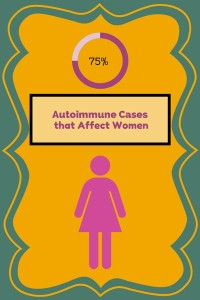 March is Autoimmune Disease Awareness Month — A time to get the word out about autoimmune (AI) diseases and how they can affect you or someone you love. The National Institute of Arthritis and Musculoskeletal and Skin Diseases (NIAMS) describes autoimmune diseases this way: “In an autoimmune reaction, antibodies and immune cells target the body’s own healthy tissues by mistake, signaling the body to attack them.” Basically the body attacks itself.
March is Autoimmune Disease Awareness Month — A time to get the word out about autoimmune (AI) diseases and how they can affect you or someone you love. The National Institute of Arthritis and Musculoskeletal and Skin Diseases (NIAMS) describes autoimmune diseases this way: “In an autoimmune reaction, antibodies and immune cells target the body’s own healthy tissues by mistake, signaling the body to attack them.” Basically the body attacks itself.
Celiac disease, rheumatoid arthritis, lupus, type 1 diabetes are all examples of autoimmune disease. About 24 million Americans have an autoimmune disease and women are more likely to have the AI trouble. Knowing your family history is very important. I recently did a post highlighting many of the autoimmune diseases out there. Click here to see that.
What’s there to know about autoimmune disease in women?
- 3/4 of autoimmune cases are in women. Why? There is no firm answer right now but John Hopkins Medical Institutions FAQ sheet says “It is likely that hormones play an important role”. A 2004 study published by by the Centers for Disease Control agreed with the hormones statement but also had another possible reason, “circumstantial evidence links autoimmune disease with preceding infections.”
- Some autoimmune disease are more common in women and some are more common in men. Womenshealth.gov has a list of which AI diseases affect women more, including celiac, Hashimoto’s, and Graves diseases as well as rheumatoid arthritis (see the full list here). But Johns Hopkins says “Type 1 diabetes, ankylosing spondylitis and autoimmune myocarditis are actually more common in men. It seems likely, therefore, that there will be multiple reasons for the sex related bias in autoimmune disease.”
American Autoimmune and Related Diseases Association has an interesting table on this showing the ratio of female diagnoses to male diagnoses. Hashimoto’s Thyroiditis — 10:1 in a ratio of women to men, respectively. See the table here.
- Getting an autoimmune diseases can be especially common for women during childbearing years of 20-45 years old.
- Be aware of your family history. Make sure your physician knows of any autoimmune disease in your family. “There is a genetic predisposition to develop autoimmune disease, but then it does take something else to get it started,” Noel Rose, MD, PhD, Director at Johns Hopkins Center for Autoimmune Disease Research said when I interviewed him this week. He mentioned infection as being one trigger, but he also said, “some drugs are well studied that can trigger Lupus or Lupus-like disease in genetically predisposed people.” In this example, if you stop using the drug, the Lupus symptoms will go away.
- Recognize the early signs of autoimmune disease. We acknowledge that with more than 80 autoimmune diseases, it would take a lot of time and worry to know every symptom of every disease. Dr. Rose says fatigue is the biggest one. “More than just tired,” Rose says. “Fatigued to the point of not being able to do daily work.” Also be aware of any major changes to your body and how you feel.
Ladies keep your awareness up and spread the word about autoimmune disease. But don’t worry about getting an autoimmune disease. Next week watch for an article on what you can do to try and prevent autoimmune disease.
Tags: autoimmune, celiac, disease, disorder, gluten-free, graves, Hashimoto, rheumatoid arthritis



Leave a Reply